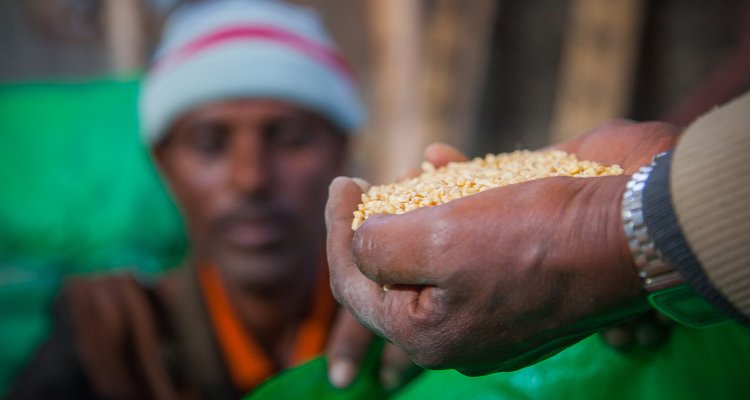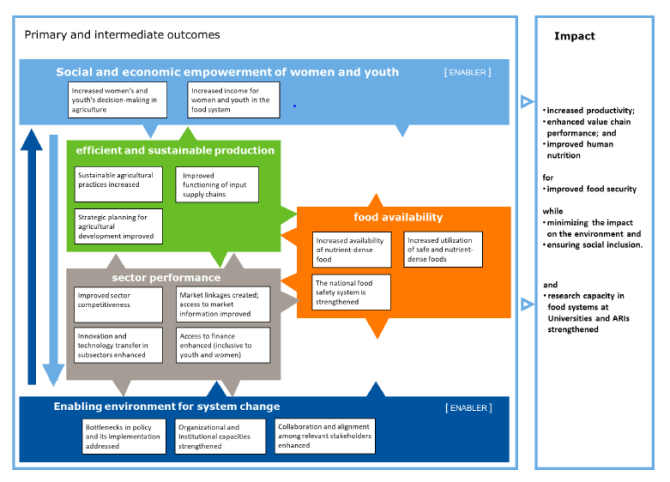
Project
Resilient Agriculture for Inclusive and Sustainable Ethiopian food systems (RAISE-FS)
The four-year Resilient Agriculture for Inclusive and Sustainable Ethiopian Food Systems programme (RAISE-FS) is aimed to bring about transformation in the Ethiopian food system. RAISE-FS will develop and implement a demand-driven and interdisciplinary approach to Research for Food System Transformation and as such contribute to the Government of Ethiopia’s transformational agenda.
RAISE-FS envisions more resilient, inclusive, and sustainable food systems in Ethiopia:
- Resilient to biophysical and economic shocks
- Inclusive of women, youth, smallholders, low-income communities and marginalized groups
- Sustainable environmentally, socially and economically
Theory of Change: food systems approach
The RAISE-FS Theory of Change adopts the food system approach. As such, analysing the drivers and food system activities that contribute to the transformation of the food system by addressing leverage points, resulting in increased productivity, enhanced value chain performance and improved human nutrition for improved food security while minimizing environmental impact and ensuring social inclusion is key. Three food systems with relevance to Ethiopia are considered:
- Low potential, food insecure (non-commercial)
- High potential, moderately food-secure (semi-commercial)
- Commercial orientation
RAISE-FS will work on understanding the mechanisms and creating evidence of how rural households can increase their livelihoods or step-up the food system. The programme specifically works to achieve five specific interrelated outcomes that can ensure demonstrated evidence to promote, resilient, inclusive and sustainable food systems in Ethiopia. The outcomes are:
- Social and economic empowerment of women and youth in food systems
- Efficient and environmentally sustainable production increased
- Sector performance and value chains enhanced
- Availability of safe and nutritious foods increased
- Enabling environment for system change enhanced

Approach
The programme is in alignment with the Dutch government's development assistance strategy- aid and trade policy. The pathways of influence of RAISE-FS are linked to the role of Wageningen University & Research (WUR) and its implementing partners as knowledge institutes that foster technological innovations and contribute to the knowledge agenda, targeting on Research for Food System Transformation (R4FST) and oriented to:
- identifying testable innovations in policy, practices, and institutions from both national and international experiences
- testing and validation of relevant innovations together with local implementing partners
- demonstration of evidence of innovation
- engage with collaborating and scaling partners for institutionalization and mainstreaming
- scientific documentation lessons to contribute to science
Building on the success of Bilateral Ethiopian-Netherlands, Efforts for Food, Income and Trade (BENEFIT), RAISE-FS will follow a commodity approach. Accordingly, spices and herbs, oilseeds, potato, pulses, poultry and food security crops have all been identified through a robust process and with inclusion of a variety of stakeholders.
Where is RAISE-FS present?
RAISE-FS works in four regions of the country: Amhara, Oromia, SNNPR and Tigray,. It targets about 35 woredas and addresses the key systemic bottlenecks in a demand driven manner. Each region will have its own focus:
| Food System | Tigray | Amhara | Oromia | South |
|---|---|---|---|---|
| Commercial orientation | Pulses | Oilseeds | Spices & herbs | Poultry |
| High potential, moderately food secure | Potato, sorghum | Potato, teff | Potato, poultry | Potato, pulses |
| Low potential, food insecure | Food security crops | Food security crops | Food security crops | Food security crops |